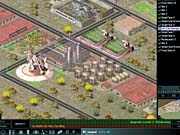Legacy Online Preview
Want to be an industrial tycoon or a media mogul? There's plenty of fierce economic competition to be found in Sega.com's online strategy game.
Despite the blazing popularity of online role-playing games, we've seen few recent attempts at making the persistent-world online model work for strategy games. One issue for such games is what to do when a player is offline, particularly in empire conquest games where players wouldn't like to come back online to find their cities ablaze from an attack that occurred while they were offline. While some popular Web-based empire strategy games have made good use of turn-based mechanics to get around this problem, Legacy Online's developer Oceanus Communications took a different approach by focusing its game on economic competition. The result is a real-time game that's part SimCity and part Capitalism, but the pressure of competition gives Legacy Online an exciting edge over its offline counterparts.

Legacy Online has been in open beta for some time, but it's been going by the name Star Peace. In December, Sega.com picked the game up and has been working with the developer to put the final touches on a launch version that's due out on March 4. Legacy Online is part of a new Sega.com program to publish online PC games, and the publisher is not only taking care of mundane online tasks like hosting and billing, but has put some effort into adding an extra layer of polish to the game's presentation than what's seen in the current beta.
The game starts you out with $100 million, and you are left to your own devices to find your way to money, prestige, and political power. The setting feels much like modern-day urban landscapes, but there's a tinge of sci-fi that helps justify some of the gameplay elements. Game servers represent planets, which each hold a maximum of around 500 players, and new colonies start out quite barren since the entire society and economy are driven by the structures that players build and own. You can specialize in any number of different pursuits, including manufacturing, retail commerce, and real estate, and high-powered tycoons can even buy into TV stations and legal firms that provide services to other players. The key to success is establishing niche businesses in growing locales, because a store surrounded by competitors with lower-priced or higher-quality competitors isn't likely to turn a profit.
The economic system is quite sophisticated, with many types of businesses to get into, but new players have some advantages so early stumbles aren't crippling. To start a new company, the first thing you need to do is build a company headquarters, then a headquarters for each of four business areas: industry, commerce, real estate, and civics. It's at these buildings that you'll do the basic research that gives you access to specific kinds of business and where you can do research that upgrades the efficiency or quality of your products.

An easy first step is to get into selling products that are created by other players or that are available at the neutral trade centers available to low-level players. There are a number of overlays for the main map that let you find areas that don't have saturated coverage for a given kind of business, say book stores or car dealerships. Towns can get pretty crowded on a server with hundreds of players, but each planet does have 15 towns, and the population grows as the economy develops, so a well-run town will reward players by creating new demand for products and services.
Legacy Online isn't a heavy-handed economics course, but it does follow business principles. For example, price competition isn't a healthy way to get new business, because if one player drops the price of something to pump up business volume, that puts pressure on other players to drop prices and cut into profits. One way to undersell competitors that specialize in retail is to get into manufacturing and try to produce products at a lower cost. There's a ton of money to be made in industry, but it takes an investment. Each new industrial building must be researched before it can be built, and putting money into developing efficient technologies is critical.
Riches and Transcendence
So even here it's necessary to specialize in overlapping areas. For example, you could start the game by building restaurants and food stores, turning to trade centers to get initial goods, then build farms and food processing plants. A related investment could even put you in the business of producing the liquor that turns farm-fresh products into the booze served at restaurants and bars. But these more complicated arrangements aren't even possible without warehouses, which store buffer inventory and can be set to import or export goods to other players. There's an easy interface for finding other businesses that offer to sell or buy goods, and much of this can be done even when the other players are offline.

Legacy Online has a level system that gives new players some early advantages, but it limits many kinds of businesses to players at higher levels, plus you can own only 50 businesses for every level. There's a total of eight levels, so each advancement is quite significant. At the two lowest levels, you get a big refund when demolishing a nonperforming business, and at the end of a game year--roughly 12 hours of real time--you also get back a large portion of any money spent on research. To advance in level, it takes not only money, both a single outlay for the application and a certain level of profitability, but also prestige, points awarded or subtracted for engaging in certain types of business and for investing in improving local towns with civic buildings like schools and fire stations. By the fifth level, you can engage in all business types, and at the sixth, you have the option to transcend.
While the economy is plenty interesting, there are additional gameplay options for very successful tycoons. First of all, there's a political dimension to the game, as each town has an elected mayor and each planet has a president. Mayors play an important role in shepherding their otherwise laissez-faire communities by assigning zoning, setting town taxes, and using tax money for civic improvements. Later on, there's the option to transcend, which is an unusual end-game maneuver that skims the top players off a server, opens up the land their businesses were taking up, and totals up all their accomplishments. To transcend, you build a mausoleum, which will be a permanent reminder of your legacy, and after a few hundred game years, all other traces of your existence are wiped off the planet. In the process, all assets and accomplishments are totaled up, and you get a certain number of nobility points. If you earn enough nobility points, you then have the opportunity to play on multiple planets at once.

Legacy Online is freely available in its beta state on the Star Peace Web site, but it will soon launch in a more polished version. Sega.com has worked with the developers to add an improved tutorial and visual enhancements to the version that will be released on March 4, and there are plans for ongoing upgrades. The game will only be distributed online, but the client download isn't very big, around 40MB for the beta. There won't be any up-front cost even after the official launch, and the first two weeks of play will be free. After that, there will be a subscription fee of $9.99 per month.
Got a news tip or want to contact us directly? Email news@gamespot.com
Join the conversation